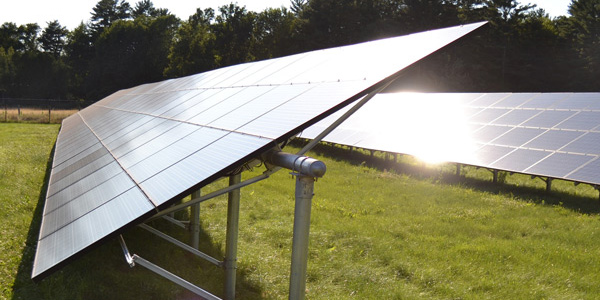By Christen Smith
Democratic lawmakers in Pennsylvania appear more hungry than ever to transition the state’s electricity consumption to 100% renewable energy, though it’s unclear whether the current plan will make it past the General Assembly’s Republican gatekeepers.
Companion proposals — House Bill 1425 and Senate Bill 630 — would phase out fossil fuels statewide by 2050, potentially making Pennsylvania the latest in a wave of Mid-Atlantic states to adopt aggressive clean energy targets to combat climate change. Some 21 of the 26 senators and 79 of the 102 representatives needed to pass the bills have signed on as cosponsors, including four Republicans in the Senate and seven in the House of Representatives.
“Embracing the clean energy revolution is the right thing for Pennsylvania,” said Sen. Tom Killion (R), prime sponsor of SB 630. “Passing this legislation will help ensure Pennsylvanians enjoy clean air and pure water for decades to come and the corresponding economic benefits of the clean energy economy.”
“When it comes to Pennsylvanians committing to a just transition to 100% renewable energy, I recommend we follow the old aphorism that ‘people who say it can’t be done shouldn’t interrupt those who’re already doing it!’” said Rep. Chris Rabb (D), prime sponsor of HB 1425. “When enacted into law, this bill will codify the goals and means by which we will make these vital aspirations a reality by 2050 — because our commonwealth’s brightest future must start now. And I have 99 colleagues in the Pennsylvania General Assembly who agree that the future is green!”
Still, Rabb and Killion have some convincing left to do as the legislature’s fall session nears — and even then, it will still be a heavy lift to get the bills onto the floor for a vote.
Unlike its neighbors to the east and south, Pennsylvania’s natural gas production from its Marcellus Shale region thunders on and keeps energy prices so low in PJM that other generation sources seek subsidies just to keep up. The Pennsylvania Independent Oil and Gas Association (PIOGA) forecasts that shale gas will supply 30% of the nation’s gas demand by 2030 and generate $1.8 billion in state and local tax revenues by next year.
State Republicans have long been champions of natural gas — especially House Speaker Mike Turzai, the most prominent beneficiary of the industry’s campaign donations, with $128,000 to his name as of the last election cycle. In June, he reiterated the caucus’s commitment to capitalizing on the state’s gas production, saying, “Pennsylvania has already benefited immensely from the boom in natural gas extraction, and House Republicans are dedicated to building on those gains rather than endangering them.”
Turzai also frequently touts the cumulative $16.2 billion reduction in utility bills over the last decade, 30% drop in carbon dioxide emissions and tens of thousands of jobs created — all from the shale gas revolution.
Mike Straub, spokesperson for the House Republican Caucus, told RTO Insider on Monday that he hasn’t heard anyone mention HB 1425, but that doesn’t mean renewable energy isn’t important to its 110 members.
“I think there’s been support for renewable energy in many different forms,” he said. “It’s always a balancing act to ensure Pennsylvania’s energy portfolio includes the right mix [of resources] that is best for consumers, employers and the economy.”
While Senate Majority Leader Jake Corman (R) doesn’t carry the same clout among industry donors, some 55 gas wells remain active in his district, according to state records. It’s a tiny share — less than 1% of Pennsylvania’s nearly 28,000 active wells — but large enough to give the Centre County Republican pause when it comes to proposals that might challenge its economic foothold.
As recently as June, he criticized Democratic Gov. Tom Wolf’s call for a severance tax on natural gas that would replace the impact fee currently dispersed to the state’s 67 counties for economic reinvestment.
Nick Troutman, spokesperson for the Senate Environmental Resources and Energy Committee, said a vote on HB 630 is unlikely in the near future.
“More discussion needs to take place on the federal and the state levels. Over the next 20 to 30 years, energy demand is expected to rise significantly, and renewable energy production is not without its challenges,” he said. “We need a diverse energy portfolio, which includes fossil fuels, in our energy mix.”
Political Will
Even if Republican leaders allow a vote, however, PIOGA Executive Director Dan Weaver called switching to renewables in just 30 years “impractical.” He said natural gas will remain an “important” sector of the resource mix because combined cycle plants provide efficiency and reliability at a cheap price.
“Pennsylvania’s businesses and families will benefit from energy production options based on market forces, and that includes obtaining more energy in the future from renewable sources,” he said. “We do not support overly generous government subsidies of any kind that benefit some sources at the expense of others, nor do we support increased taxes on sources that put them at a competitive disadvantage.”
David Masur, executive director of PennEnvironment, argued that the bills’ collective 100 cosponsors mean it’s time for “a real dialogue.” He said six states have approved similar policies in the last 12 months, including “purple states” like Maine and Nevada, “paving that path for Pennsylvania to do it as well.”
“When we look back on who had the political will to do what it takes to protect our planet from the far-reaching negative effects of global warming, this will be the group of legislators recognized for their work in Pennsylvania,” he said. “Because the question is not, ‘Do we have the technological ability, the financial wherewithal, or the work ethic to tackle climate change?’ The only question is, ‘Do we have the political will?’”
The House returns to session Sept. 17, though Straub said the legislative calendar is still taking shape. Some energy bills will be on the agenda, he noted, but not necessarily HB 1425. The Senate convenes the following week.




